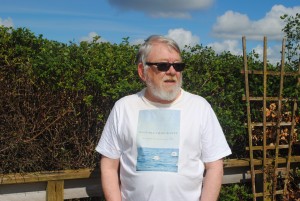Privileged information reveals expats were asked to be spies
 A very special privilege we enjoy as oral historians is to gain access to the innermost thoughts and personal memories of our interviewees. Without their insights our work investigating and explaining the nature of postwar English immigration to Canada would be incomplete and less colourful. Above all, meaningful analysis of immigrant lives would be severely restricted – as one historian observed, writing about migration without oral history “would be like doing a difficult jigsaw in the dark”. The recorded life stories generate rich content, providing a level of detail about the personal experience of migration often missing from most documentary sources.
A very special privilege we enjoy as oral historians is to gain access to the innermost thoughts and personal memories of our interviewees. Without their insights our work investigating and explaining the nature of postwar English immigration to Canada would be incomplete and less colourful. Above all, meaningful analysis of immigrant lives would be severely restricted – as one historian observed, writing about migration without oral history “would be like doing a difficult jigsaw in the dark”. The recorded life stories generate rich content, providing a level of detail about the personal experience of migration often missing from most documentary sources.
Interviewees’ testimonies bring historical interpretations to life. Recorded life stories are intensely private, often funny, and occasionally heartbreaking. Many of the English-born immigrant interviewees with whom we spent time talked frankly about their fears, expectations, and family separation anxieties. Others referred mainly to their public lives, revealing insights into how individuals and families integrated into local communities and the Canadian way of life. Some accounts were positive, others negative; some were sad, others happy; some were success stories, others were not. They revealed memories about hardship, first impressions, culture shock, love, family, illness, death, ambition, work, patriotism, and much more.
Oral testimonies, though, can bring with them a number of problems. For instance, how reliable are interviewees’ memories? Are their reminiscences tainted by rose-tinted spectacles, and to what degree are they recalling what they think the interviewer wants to hear? There are many techniques to overcome these potential weaknesses. Finding corroborative evidence from other sources as well as from other interviews and always asking open-ended questions to minimise interviewer-led bias are two of the most common.
One of the most surprising stories that appears in a new book, Invisible Immigrants: The English in Canada since 1945, provides a perfect example of this process. Deep into one interview, with a married couple in Ontario, the slightly apprehensive wife launched into a long-forgotten memory of the Cold War when she was followed by the RCMP (Royal Canadian Mounted Police) and pressurised by them to spy on a Vladimir and Olga Oshkaderov. The Russian couple were diplomats the interviewees met socially at a function at the Soviet Embassy. The immigrant couple felt intimidated by the RCMP and rejected their request to spy on the Soviets – as the husband remarked, “I thought the Mounties were supposed to be the good guys.” The Oshkaderovs were later expelled as spies.
Not surprisingly, as interviewers, we were astounded by these memories and somewhat sceptical. Corroboration came after consultations with Russian specialist Professor Carter Elwood of Carleton University and former Ottawa Citizen editor Noel Taylor, who both confirmed that it was commonplace during the Cold War for the RCMP to approach recently arrived immigrants for help in establishing what foreign “diplomats” might be attempting to do.
The spy incident was one of countless stories told by postwar English-born immigrants. While this story was unique, most fell into common themes. These included a multifaceted mix of reasons for leaving England and choosing Canada as a new home; the trauma of parting from friends and family; recollections of the journey – those who came by sea and the first air travellers who flew on propeller-driven aircraft had vivid memories; first impressions of a strange land; and the process of adaptation, sometimes short and sometimes quite long, that often related to setting up a new home, making friends, integrating into a new community, finding work and building a career, raising a family, taking out citizenship, and much more.
These engaging life-story oral histories revealed the aspirations, adventures, occasional naïveté, and challenges of these hidden immigrants. This group of post-war English immigrants believed they were moving to a familiar British country. Instead, like other immigrants, they found they had to deal with separation from home and family while adapting to a new country, a new landscape, and a new culture. Although English immigrants did not appear visibly different from their new neighbours, as soon as they spoke they were immediately identified as “foreign.”
What emerged from over 1,000,000 words of testimony was a comprehensive set of evidence that goes a long way toward enhancing our understanding of Canada’s largest group of immigrants. We also learned how people from different class backgrounds, different ages and gender, married couples with and without children, and single people who came from different parts of England and who settled in different parts of Canada fared in their new homes. It was a privilege to listen to them and write about their life stories.
Invisible Immigrants: The English in Canada since 1945 by Marilyn Barber and Murray Watson is published by University of Manitoba Press.
Buy the book!
Invisible Immigrants: The English in Canada since 1945
Buy from Amazon France
Buy from Amazon Germany
Buy from Amazon Canada
Marilyn Barber and Murray Watson
Kindle edition
ASIN: B00VB02QOQ
RRP: £20.50

Leave a Reply